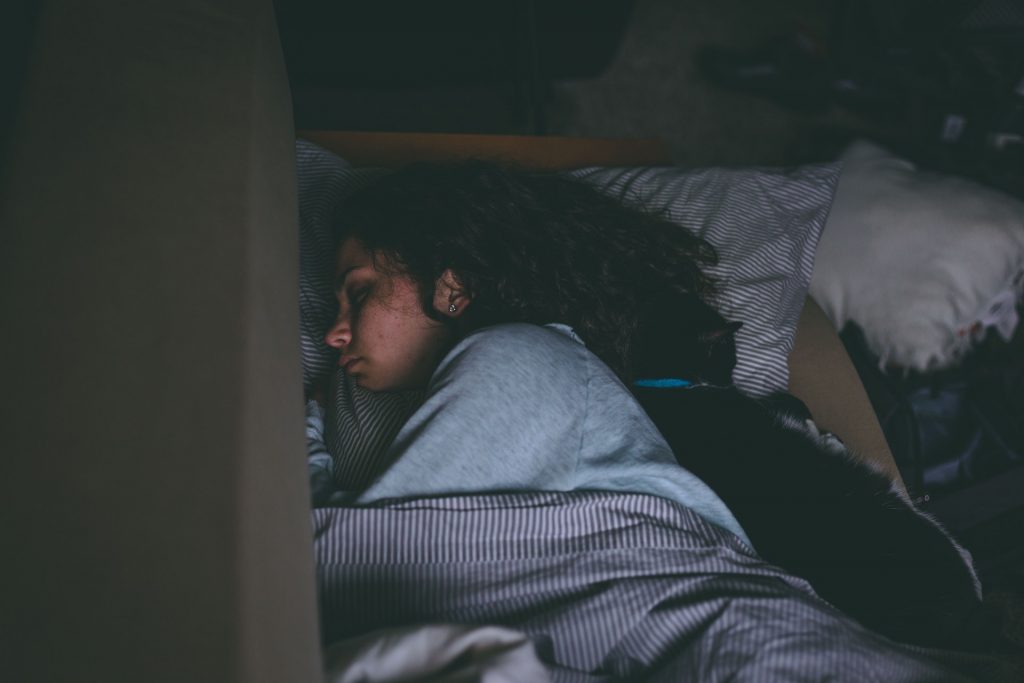Parents: Healthy Sleep Habits Start With You

First published by AFABC in Focus on Adoption magazine:
Sleep is as vital to humans as proper nutrition and exercise. Sleep researchers recommend that adults get a minimum of 7 hours a night for optimal functioning. Children should be sleeping more depending on their age.
If you’re a parent of a young child, you know nights can be broken up by bouts of illness, or early morning wake-ups due to nightmares, night terrors, hungry bellies, wet beds, soiled diapers, or a little one wanting a cuddle at 3 a.m. A recent study from the U.K. found that the new parents slept an average of 4.88 hours a night for the first year of their child’s life. They also found that parents paced over 1174 km during that year, equal to 28 marathons, trying to soothe their babies to sleep.
Short sleep duration and poor quality sleep are common among Canadian adults. About one-third of us sleep less than the recommended 7 hours per night. Insufficient sleep impacts almost every area of our wellness and is linked by research to a wide range of adverse health outcomes including an increased risk of obesity, type 2 diabetes, cardiovascular disease, depression, irritability, Alzheimer’s disease and injury. It’s also estimated that nearly 20% of fatal vehicle collisions directly involve driver fatigue.
While quality sleep helps to repair and replenish our bodies, it can also be a protective factor in our emotional well being. Researchers at the University of California, Berkeley examined the relationship between sleep abnormalities, and the areas of the brain related to our emotions. The study revealed that rapid eye movement (REM), a dreaming stage you enter after about 90 minutes of sleep, helps to process difficult emotional experiences you’ve encountered during the day so that these experiences feel less intense and emotionally charged after a solid rest.
Whether your kids are newborn, teens, or you’re in the process of planning for a family, healthy sleep habits start with adults who practice what they preach and take steps to help kids make positive associations with sleep and relaxation. There may be circumstances out of our control that disrupt our sleep, but prioritizing and returning to strategies that maximize quality sleep can help a family get the rest they need to take on whatever adventures or challenges tomorrow brings. Here are some evidence-based sleep strategies to try integrating into your routines:
Setting the stage:
- If you’ve been struggling with insomnia for longer than a few weeks (difficulty falling or staying asleep), check in with your physician or mental health care provider. There many physical and mental health issues that can contribute to or cause sleeping problems
- Avoid alcohol and limit caffeine to the morning and early afternoon
- Have a consistent sleep schedule and go to bed at the same time every night (including weekends); quality sleep comes with routine
- Set an alarm for bedtime and turn off any unnecessary lights as a reminder that it’s time to wind down
Keep TV, cell phones, tablets, and e-readers, and other light emitting devices out of the bedroom and limit their use 2-3 hours before bed. Blue spectrum light is associated with melatonin suppression, the hormone which helps control your sleep and wake cycle, but any light can delay the process. - If a family member needs a night light, opt for one with a red or amber light, which is least likely to interrupt sleep
- Keep your bedroom cool (around 18 degrees C) and dark using blackout curtain
Though long exposures to blue light is detrimental to health, but exposure to light, especially sunlight earlier in the day is important.
Getting to sleep:
- Consistent bedtime routines are for not just for kids, they are a way of telling our brains that it’s time for rest. Try taking a warm shower, reading a book, engaging in prayer or quiet reflection, or writing a 5-minute to-do list for the next day
- Listen to a guided meditation or progressive relaxation to slow down your thoughts and tune into your body’s cues for rest
Troubleshooting:
- If you find yourself restless and cannot settle within 10-15 minutes, try leaving your bed, engaging in a quiet activity, and return to bed only when you are sleepy. This strengthens the association that your bed is meant for sleep
- Cognitive Behavior Therapy for Insomnia is an effective intervention for treating insomnia without (or alongside) medications. It includes tracking sleep, shifting habits, and changing beliefs about sleep. It involves working with a therapist, or a structured online program such as Sleepio
References
Bailey, Grant. “A Study Has Found That New Parents Only Get 4 Hours and 44 Minutes Sleep in an Average Night…an Expert Reveals How to Get More.” The Sun. June 20, 2018.
Chaput, Jean-Philippe, Suzy L. Wong, and Isabelle Michaud. “This Article Provides Recent Estimates of the Duration and Quality of Sleep of Canadian Adults and of the Percentage Who Adhere to Sleep Duration Guidelines (7 to 9 Hours per Night at Ages 18 to 64, and 7 to 8 Hours per Night at Age 65 or Older).” September 20, 2017.
Harvard Health Publishing. “Blue Light Has a Dark Side – Harvard Health.” Harvard Health Blog. https://www.health.harvard.edu/staying-healthy/blue-light-has-a-dark-side.
Scullin, Michael K., Madison L. Krueger, Hannah K. Ballard, Natalya Pruett, and Donald L. Bliwise. “The Effects of Bedtime Writing on Difficulty Falling Asleep: A Polysomnographic Study Comparing To-do Lists and Completed Activity Lists.” Journal of Experimental Psychology: General, no. 1 (2018).
Walker, Matthew P. Why We Sleep: The New Science of Sleep and Dreams. Penguin Books, 2018.
